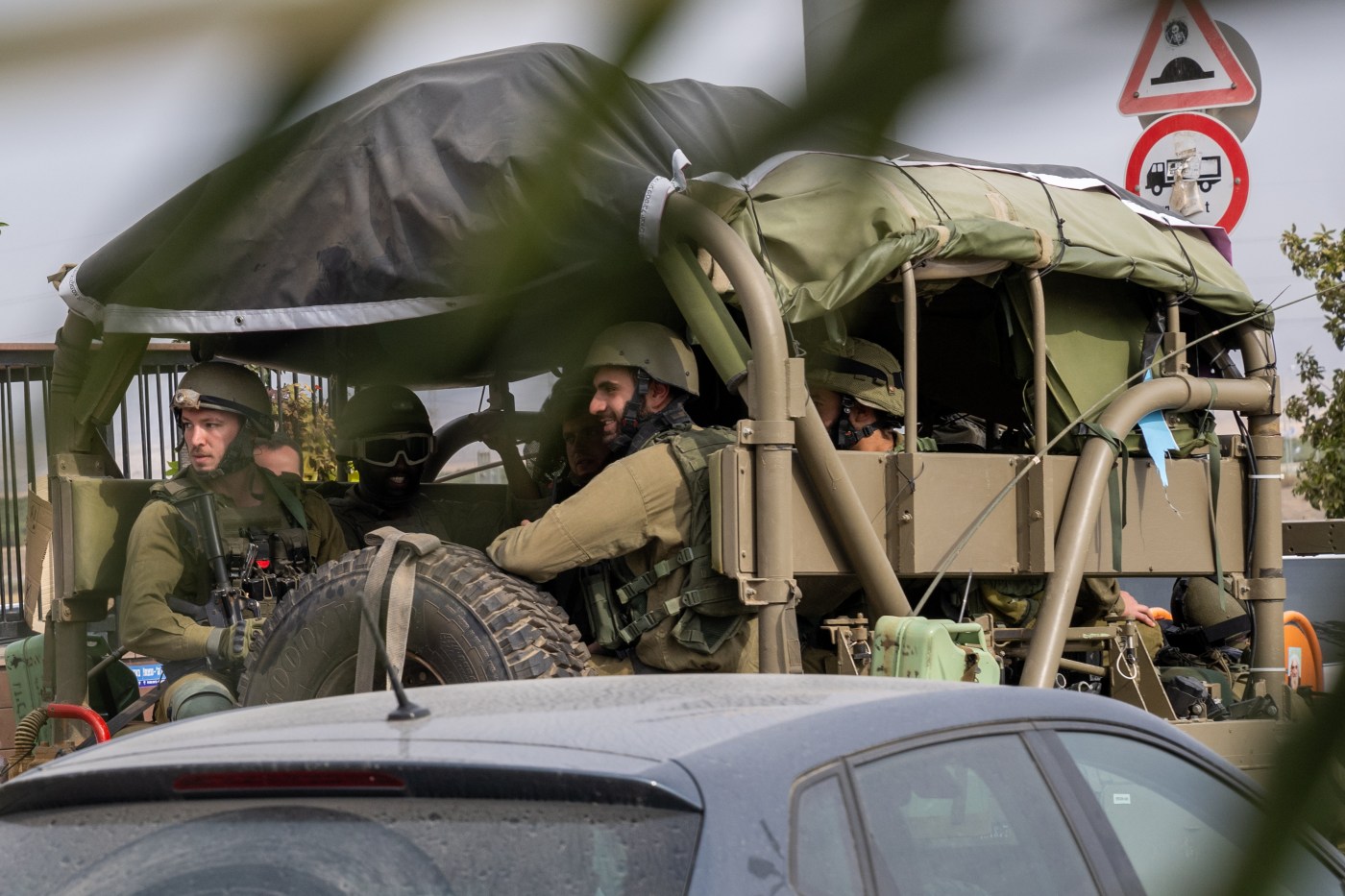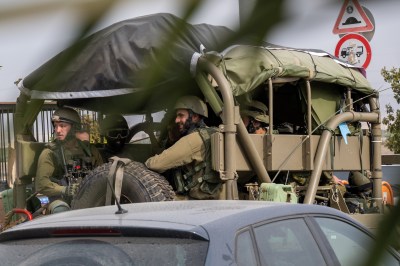It’s not often that Pope Francis, American progressives, and Russian President Vladimir Putin find common ground. But in the 38 days since Hamas’ attack on Israel, they’ve all joined the growing chorus of global voices calling for a ceasefire in the ongoing war. “I implore you to stop, in the name of God,” the head of the Catholic Church said this month in an impassioned plea for peace.
But for Israel, a desire for peace and demands for a ceasefire are far from synonymous. The October 7 massacre of more than 1,200 Israelis (recently revised downward from 1,400), itself a breach of a previous ceasefire agreement, punctuated a lesson learned over decades of fighting against Hamas: The group governing Gaza isn’t seeking coexistence with the state of Israel. The options for Israel are now whether to cave to mounting international pressure for a ceasefire, allowing Hamas to live to attack another day, or rid the Gaza Strip of the terrorist group bent on inflicting suffering on Israelis at any cost to its own people.
Countries like Iran and China, advocacy groups like Amnesty International, and the United Nations have also been among those calling for an immediate halt in fighting amid the mounting civilian death toll in Gaza. “The nightmare in Gaza is more than a humanitarian crisis. It is a crisis of humanity,” U.N. Secretary-General António Guterres said from New York this month. “The parties to the conflict—and, indeed, the international community—face an immediate and fundamental responsibility: to stop this inhuman collective suffering and dramatically expand humanitarian aid to Gaza.”
The Hamas-run Gaza Health Ministry reported Monday that at least 11,000 people had been killed—a figure that, if accurate, doesn’t distinguish between civilian and combatant deaths. But Israeli and American officials alike concede that civilian casualties are an inevitable consequence of the ongoing ground campaign against Hamas, even as Israel tries to minimize civilian deaths by urging the residents of northern Gaza to evacuate South.
Compounding the difficult equation is the continued captivity of an estimated 240 people kidnapped by Hamas fighters into Gaza on October 7. Israeli Prime Minister Benjamin Netanyahu has repeatedly rejected calls for a ceasefire that don’t include the immediate release of each hostage, now maintaining that military action is the best way to press for their freedom as negotiations flounder. American officials reportedly pushed Israel to delay its ground offensive into Gaza to continue hostage talks last month, and now, as Israel’s forces close in on Gaza City, are urging it to consider days-long pauses in fighting to allow for continued diplomatic overtures.
But international calls for a ceasefire put Israel on a tricky timeline despite its recent military successes in Gaza, including its killing of high-level Hamas commanders and multi-front advances toward the group’s alleged headquarters. “The problem is that you have two clocks running. There’s a military clock running, which is kind of proceeding quite nicely. But then you have a diplomatic clock, which may be closing in. Israel’s wars usually end with imposed ceasefires,” Jonathan Spyer, a Jerusalem-based analyst and director of research at the Middle East Forum, told The Dispatch. “The diplomacy often catches up with Israel before it has completed its military goals, and it’s certainly possible that’s what could happen this time too.”
It’s happened before. One example came at the end of the 1973 Yom Kippur War, when U.S. President Richard Nixon intervened to prevent Israeli forces’ destruction of the Egyptian Third Army after it was surrounded in the Sinai Peninsula, pressuring Jerusalem to comply with a U.N. Security Council resolution calling for the end of hostilities. Another came after more than a month of war with Lebanese Hezbollah in 2006, when Israel reluctantly agreed to another U.N. Security Council resolution that would’ve required the terrorist group to disarm and withdraw away from the border with Israel, but which the United Nations and Lebanese government never properly implemented. Hezbollah now has fighters and military infrastructure all along the border, in addition to its arsenal of more than 150,000 rockets and missiles capable of striking deep into Israeli territory.
Positioning itself on the edge of Israeli territory “means Hezbollah has a broader range of attack options against Israel,” David Daoud, a senior fellow at the Foundation for Defense of Democracies who focuses on the Lebanese terrorist group, told The Dispatch. “They’re right on the border, so they have the option for using short-range, accurate weapons like the anti-tank and other missiles they’ve been firing in recent days. It also keeps their Katyusha rocket arsenal, the overwhelming bulk of their arsenal, in play.”
Israel has also been burned by efforts to placate Gaza. In 2005, Israel withdrew its troops and citizens from the Gaza Strip, handing Gaza and its vacated Israeli agricultural settlements over to the Palestinian Authority in the hopes of easing the threat of terrorism emanating from the territory. Hamas won parliamentary elections in Gaza the following year, and, in 2007, staged a full military takeover of the Strip. It’s used the coastal enclave to launch attacks against Israel ever since, often violating the many ceasefires adopted throughout the years—including on October 7.
It’s a complicated history perhaps best understood in the U.S. by career diplomats who witnessed the various waves of fighting and broken truces since Hamas’ full takeover of Gaza. “Hamas is a terrorist organization. It has made very clear it is committed to the elimination of the state of Israel. And it has consistently broken ceasefires over a number of years,” former Secretary of State Hillary Clinton said on The View talk show last week. “A ceasefire done prematurely benefits those who do not abide by any laws, by any rules.”
National Security Adviser Jake Sullivan, who negotiated failed truces between Israel and Hamas during outbreaks of fighting in 2012 and 2021, was likewise clear-eyed in his assessment of the group’s methods and goals. The fact that Hamas uses “people as human shields” does not minimize Israel’s obligation to defend itself, he said in an interview last month. “After 9/11, if the terrorists had simply said, ‘We want a ceasefire,’ I don’t think the United States would have said, ‘We’re gonna stop going after terrorists.’”
Instead of full ceasefires, Biden administration officials continue to push Israel for “humanitarian pauses” in Gaza, arguing they could achieve some of the proposed ceasefires’ objectives without undermining Israel’s goal of uprooting Hamas. U.S. negotiators hope to use reprieves from fighting to get humanitarian relief into Gaza and allow civilians more time to leave the combat zone, while also pressuring Hamas to release more captives. Israeli officials, for their part, say they’ve already been implementing localized pauses as they secure evacuation routes for Gazans fleeing south. Some 50,000 people left northern Gaza in a single day last week, Israeli officials said, and Israel Defense Forces (IDF) are poised to continue daily, four-hour pauses in hostilities as it secures additional territory in the Strip.
But Israeli officials fear prolonged delays in the offensive could allow Hamas to regroup and rearm. The group has already exploited humanitarian channels in Gaza to its own advantage by putting its wounded fighters on evacuation lists and stashing food, fuel, and medical supplies for itself.
As the IDF advances on the densely populated Gaza City from all sides, civilian and combatant death tolls are sure to increase—and, along with them, calls for an immediate ceasefire. Israeli officials have argued the war could end today if Hamas laid down its arms and released its hostages, but in the absence of such a development Israel is unwilling to accept anything short of the end of its de facto governance of Gaza.
Hamas leaders, meanwhile, have reiterated their goal to eliminate Israel many times since the massacre last month, openly vowing to wage a “permanent” war against Israel at the same time that the international community tries to coerce it into a diplomatic solution.
“It was generally assumed that Hamas had gotten used to being a governing authority and Gaza, and benefited from that, and wished to continue being that and therefore, to some degree, it could be dealt with by a combination of carrots and sticks,” Spyer said. “That whole conception was destroyed on October 7, when it became apparent that Hamas was not deterred, that it was not a minor problem, and that it was able to carry out acts of enormous consequence and brutality.”







Please note that we at The Dispatch hold ourselves, our work, and our commenters to a higher standard than other places on the internet. We welcome comments that foster genuine debate or discussion—including comments critical of us or our work—but responses that include ad hominem attacks on fellow Dispatch members or are intended to stoke fear and anger may be moderated.
With your membership, you only have the ability to comment on The Morning Dispatch articles. Consider upgrading to join the conversation everywhere.